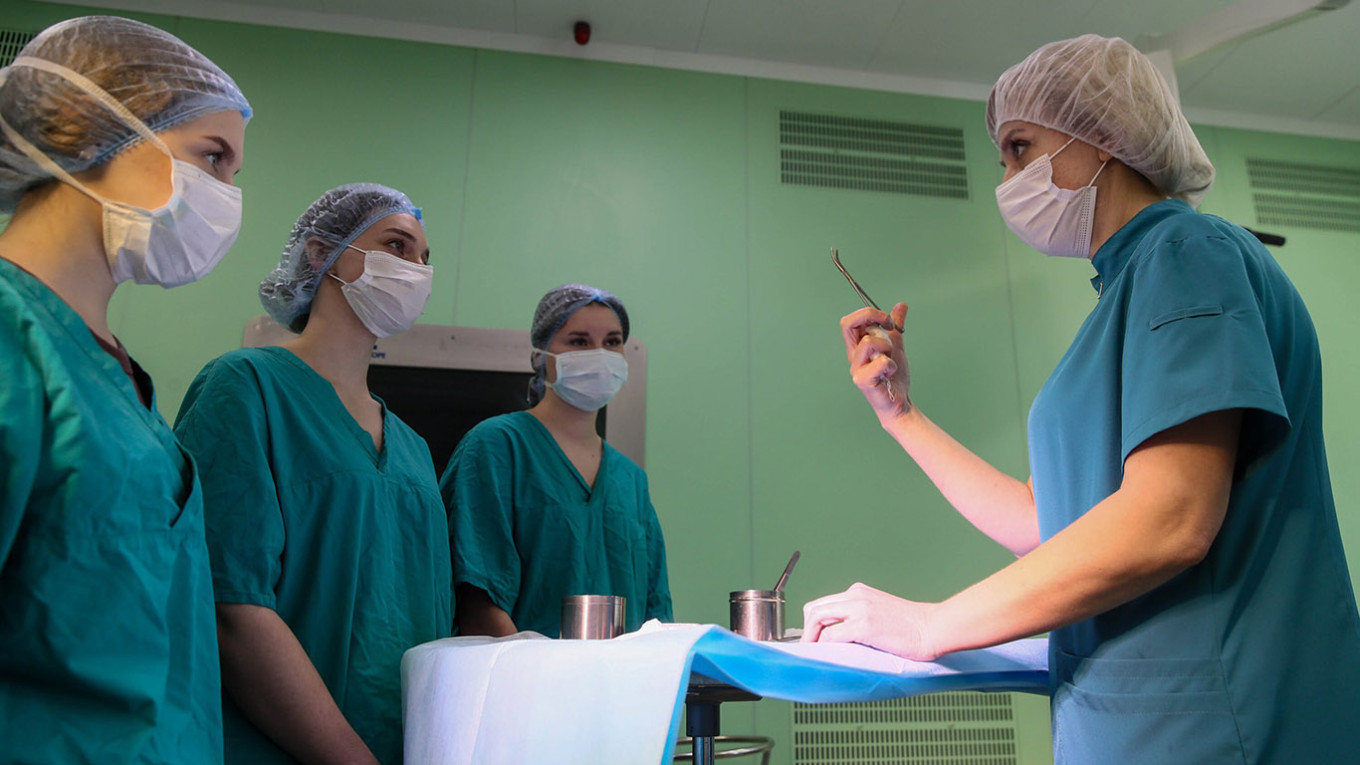After completing their medical education, aspiring medical professionals and surgeons in Russia are required to undertake a residency to acquire expertise in their chosen specialty.
A new law recently enacted by President Vladimir Putin stipulates that many of these graduates will begin their careers in small, underfunded hospitals located in Russia’s regions after they finish their residencies.
Critics raise concerns that this requirement might dissuade many young individuals from choosing a medical career, especially as Russia’s healthcare system faces significant challenges.
Supported by the ruling United Russia party and praised by Health Minister Mikhail Murashko as a necessary step to address workforce shortages in the healthcare sector, this legislation has faced strong opposition from lawmakers and medical professionals, who have collectively submitted over 1,000 critical comments about the bill online.
The law requires all medical graduates participating in state-funded residency programs to fulfill their job placements at hospitals and clinics that accept state health insurance. Those who accept a state-funded residency must commit to a particular medical facility for their training once they graduate.
For graduates outside of Moscow and St. Petersburg, this frequently means agreeing to work in small, rural areas.
“I’m just starting my life and career, and I don’t want to end up living in some remote village with no future and potentially becoming an alcoholic,” remarked a medical student in a state-funded surgical residency in Tomsk to The Moscow Times.
If either the medical worker or the hospital fails to comply with the terms of this agreement, they may incur a fine that amounts to three times the value of their tuition.
Opponents of the law assert that compelling medical graduates to serve in regional or rural facilities without assurances of a reasonable salary, housing, and other support will deter young people from entering the medical field entirely.
They also caution that this could result in a healthcare system staffed by increasingly disenchanted workers and lead to the rise of partial, unregulated private healthcare providers utilizing unlicensed doctors.
“I was aware that I might have to return to my home region after university, but this law could assign me to a far-off village. I am not excited about that possibility,” said a surgeon-in-training, who requested to remain anonymous.
According to the new legislation, students who enter or are currently partaking in state-sponsored residency programs will be obligated to work for as long as three years in a hospital or clinic under the guidance of an experienced practitioner.
The areas of specialization participating in the mentorship program will be limited to categories defined by the Health Ministry.
While it’s expected that surgeons and oncologists will remain in the mentorship program for the entire three years, pharmacists and epidemiologists will not have to partake at all, based on the latest guidelines from the Health Ministry as reported by the Kommersant business daily.
Graduates who opt for work placements in rural areas, small towns, or contested Ukrainian regions will have their mentorship duration halved compared to those working in major urban centers, according to Kommersant’s report.
The lenient measures outlined this week by Kommersant seem to be a response by the Health Ministry to the strong backlash against the law.
“I’m in my residency after graduating from medical school and working for three years as an EMT. I don’t need mentors,” stated a woman currently in residency at Irkutsk Medical University.
She recounted participating in a summer mentorship program during her medical college studies when students were nominally assigned to the supervision of department heads.
“In reality, we were overseen by a junior doctor who had only recently started at the hospital herself,” she explained to The Moscow Times, requesting to stay anonymous. “I’m considering switching to pharmacology later, but many of my peers are already thinking about abandoning medical school altogether.”
A medical student hailing from Barnaul in the Altai region of southern Siberia described the newly enacted legislative changes as “demotivating” and “unfair.”
“Mandatory work placements won’t address the shortage of doctors,” the student told The Moscow Times. “Instead, it will create further issues such as exhaustion, burnout, and high turnover among medical staff. Enhancements in working conditions, pay, and housing will be what draws doctors to the regions, not coercive policies.”
This law directed at medical students in state-sponsored residency programs is part of a broader set of reforms aimed at recruiting more individuals into healthcare roles and relocating them to areas facing severe staff shortages—specifically smaller towns and rural regions away from Moscow.
In 2012, Putin mandated that doctors’ average wages should be increased to double that of the regional average by 2018.
That same year, the Health Ministry initiated the Rural Doctor Program, which promised a one-time payment of up to 2 million rubles (approximately $25,000) to physicians who commit to five years of service in rural or isolated locations.
However, as political scientist Judyth Twigg noted, “nothing has unfolded as the government envisioned.” Over a decade later, many regions continue to struggle in meeting the salary benchmarks established by Putin. For numerous physicians, the incentives offered by the Rural Doctor Program have not been sufficient to justify employment in hospitals with inadequate facilities while sacrificing their professional networks.
It appears that the new legislation is yet another short-term solution to a healthcare crisis that demands long-term strategic planning from Russian officials, as Twigg observed.
“While it’s not unusual for public funding for education to require some form of mandatory state service, the challenge here is that [the Russian government] is wrestling with persuading people to enter the medical field at all,” she told The Moscow Times.
Complicating this situation is the ongoing war in Ukraine and the Western sanctions it has triggered.
“Being a healthcare provider becomes increasingly difficult when sanctions have made it far more challenging to access essential medicines, tools, and materials required for effective patient care,” Twigg remarked.
Yet, similar to many repercussions of the war, the implications of the new law are expected to primarily impact Russia’s regions and ethnic republics.
“This isn’t a major concern for people here or in Moscow,” stated a radiologist from St. Petersburg when asked about how his colleagues might be affected.
A medical student from St. Petersburg similarly faced uncertainty regarding the potential negative effects of the law.
“People will look for ways to turn this into a benefit. They will find loopholes,” he conveyed to The Moscow Times.
“Staffing shortages are a perpetual issue in medicine,” he said. “There will always be an insufficient number of healthcare workers. Only if we were to receive millions in pay could we expect real change.”

